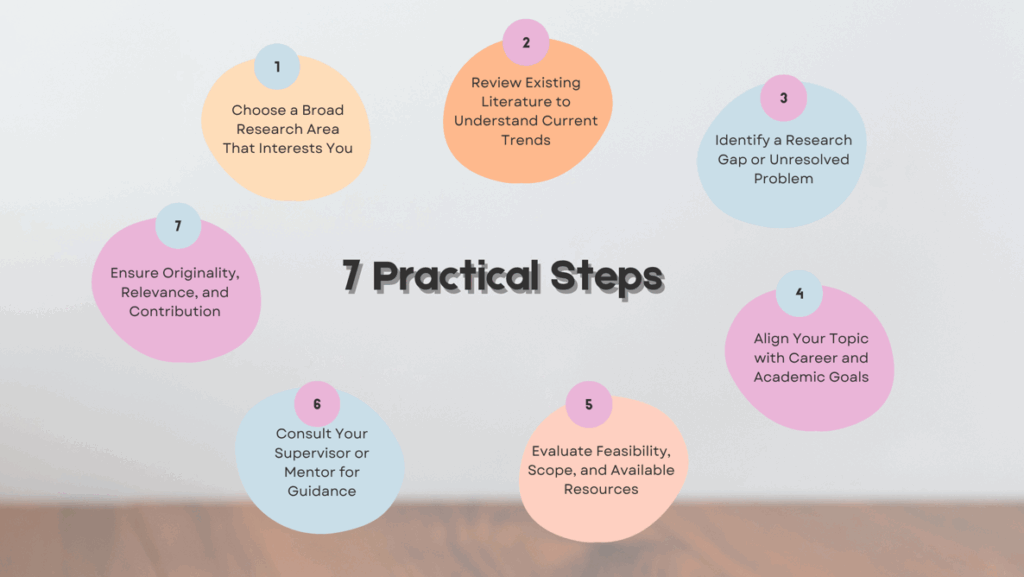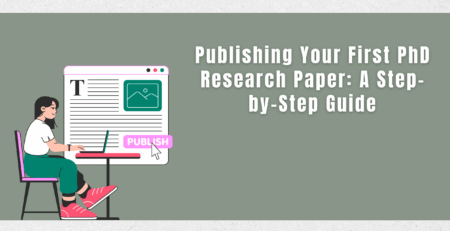09Jul

Choosing the right research topic for your PhD is one of the most crucial decisions in your academic journey. It’s not just about picking a subject you find interesting, it’s about selecting a research area that aligns with your long-term goals, academic strengths, and future impact. The right topic sets the tone for your entire doctoral journey, from your proposal to your thesis defense and beyond.
In this blog, we’ll guide you step-by-step on how to choose a research topic for PhD, along with practical tips and things to avoid. Whether you’re just starting or stuck between ideas, this guide will help you move forward with clarity and confidence.
Your PhD is a multi-year commitment. A strong research topic:
A poorly chosen topic, on the other hand, can lead to delays, frustration, and even a loss of interest.

Here’s a structured approach to help you select the ideal PhD topic:
The best PhD topics come from a genuine interest or curiosity. Consider:
Choosing a research topic for PhD becomes easier when you’re naturally inclined toward a field. Passion keeps the momentum going even when the journey gets tough.
Do a thorough review of recent publications, journal articles, conference papers, and ongoing research in your domain. This helps you:
Tools like Google Scholar, Scopus, and JSTOR are great starting points. If you’re stuck, Kenfra Research offers expert help in literature review and topic validation.
Once you understand the existing landscape, start spotting gaps or under-explored areas. A strong PhD topic should aim to:
Don’t just pick a trendy topic ensure your research fills a specific gap in knowledge.
Your topic should support your long-term vision. For instance, someone aiming for a career in AI development may choose a research topic in machine learning optimization, while a policy-oriented research may focus on public administration.
Even the most exciting topic can become frustrating if it’s too broad or unmanageable. Make sure your research is:
A PhD research topic must be focused yet flexible enough to evolve during the research.
Before finalizing your topic, discuss it with your supervisor, guide, or academic mentor. Their feedback can help you:
If you’re unsure where to begin, our PhD experts at Kenfra offer topic consultation and proposal drafting to get you on the right track.
Academic institutions value originality. Ensure that:
Use plagiarism checkers, thesis databases, and citation indexes to confirm your topic’s uniqueness.

At Kenfra Research, we understand that selecting the right topic is not just the first step, it’s the foundation of your success. We offer:
Recognized as the best IT company in Marthandam for research and academic solutions, our team of academic experts ensures that your topic is original, relevant, and impactful perfectly aligned with your goals and discipline.
Learning how to choose a research topic for PhD doesn’t have to be overwhelming. Start with your passion, explore what’s already been done, and think long-term. Take guidance when needed, and remember it’s okay to revise your topic as you go.
Your research has the power to create change. Make sure it starts with a topic that inspires you.

Thesis writing is an integral part of any academic journey, particularly for PhD and master's students. It is a... read more

If you are a researcher, academic, or student working on papers and projects, you might have heard about ORCID iD.... read more

Pursuing a PhD is a rewarding yet demanding journey. It requires intense dedication, time management, and the ability to... read more

How to Write a Winning Research Proposal Format for PhD Learn how to write Research Proposal Format for PhDA... read more

Top Research Paper Writing Consultants in Chennai and India. Kenfra Research provides comprehensive research paper writing assistance. read more

Coding qualitative data with NVivo is one of the most efficient ways to manage and analyze large volumes of non-numeric... read more
"Why Getting a PhD is Like Investing in Yourself" Introduction:Deciding to do a PhD is like putting your money in something... read more

Publishing your First PhD Research Paper as a PhD scholar is a significant milestone. It's more than just a... read more
Image Processing is a well known research field that creates content-based video recovery from the vedios in the database. This... read more

A PhD thesis represents years of dedicated research, critical analysis, and intellectual effort. However, even the most groundbreaking research... read more
WhatsApp us
Leave a Reply